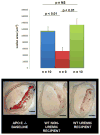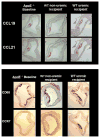Moderate kidney disease inhibits atherosclerosis regression
- PMID: 19931862
- PMCID: PMC3175796
- DOI: 10.1016/j.atherosclerosis.2009.10.029
Moderate kidney disease inhibits atherosclerosis regression
Abstract
Chronic kidney disease (CKD) accelerates cardiovascular disease. The mechanisms that explain this independent, excess risk associated with CKD have not been fully elucidated.
Objectives: We propose that impaired regression of atherosclerosis in renal disease represents a novel risk factor for the heightened morbidity and mortality and resistance to treatment observed in patients with CKD.
Methods and results: Using a transplant model to study atherosclerosis regression, we transplanted atheromatous aortic segments generated in Apolipoprotein E knock-out (ApoE(-/-)) mice, into either control or moderately uremic, normolipidemic, wild-type mice. In non-uremic mice, lesions regressed 55%, whereas lesions in uremic mice increased in size by 17% (p<0.01 for control vs. uremic). The lesions in uremic mice were also characterized by a greater presence of macrophages (36,300 microm(2) vs. 12,600 microm(2), p<0.01). This finding was despite upregulation of chemokine receptor 7 (CCR7), normally a migration factor, in uremic lesion macrophages. Gene expression analysis of lesion macrophages showed relative down-regulation of serum response factor (SRF) target genes in the uremic group, consistent with impaired CCR7 signaling.
Conclusion: Moderate kidney disease inhibits regression of atherosclerosis in a mouse transplant model. This inhibition may be a result of impaired CCR7 signaling.
Copyright 2009 Elsevier Ireland Ltd. All rights reserved.
Figures



Similar articles
-
Atherosclerosis in chronic kidney disease: the role of macrophages.Nat Rev Nephrol. 2011 Jan;7(1):45-54. doi: 10.1038/nrneph.2010.157. Epub 2010 Nov 23. Nat Rev Nephrol. 2011. PMID: 21102540 Free PMC article. Review.
-
Cardiovascular effects of uremia in apolipoprotein E-deficient mice.Dan Med Bull. 2009 Nov;56(4):177-92. Dan Med Bull. 2009. PMID: 19939336
-
Uremia accelerates both atherosclerosis and arterial calcification in apolipoprotein E knockout mice.J Am Soc Nephrol. 2005 Jan;16(1):109-16. doi: 10.1681/ASN.2004060495. Epub 2004 Nov 24. J Am Soc Nephrol. 2005. PMID: 15563564
-
Deletion of Macrophage Low-Density Lipoprotein Receptor-Related Protein 1 (LRP1) Accelerates Atherosclerosis Regression and Increases C-C Chemokine Receptor Type 7 (CCR7) Expression in Plaque Macrophages.Circulation. 2018 Oct 23;138(17):1850-1863. doi: 10.1161/CIRCULATIONAHA.117.031702. Circulation. 2018. PMID: 29794082 Free PMC article.
-
Atherosclerosis and vascular calcification in uraemia - a new experimental model.Prilozi. 2007 Dec;28(2):11-24. Prilozi. 2007. PMID: 18356775 Review.
Cited by
-
Exogenous BMP7 in aortae of rats with chronic uremia ameliorates expression of profibrotic genes, but does not reverse established vascular calcification.PLoS One. 2018 Jan 5;13(1):e0190820. doi: 10.1371/journal.pone.0190820. eCollection 2018. PLoS One. 2018. PMID: 29304096 Free PMC article.
-
Atherosclerosis in chronic kidney disease: the role of macrophages.Nat Rev Nephrol. 2011 Jan;7(1):45-54. doi: 10.1038/nrneph.2010.157. Epub 2010 Nov 23. Nat Rev Nephrol. 2011. PMID: 21102540 Free PMC article. Review.
-
Mild to moderate chronic kidney disease and cardiovascular events in patients with type 2 diabetes mellitus.Vasc Health Risk Manag. 2019 Aug 22;15:365-373. doi: 10.2147/VHRM.S203925. eCollection 2019. Vasc Health Risk Manag. 2019. PMID: 31686830 Free PMC article. Review.
-
Use of Measures of Inflammation and Kidney Function for Prediction of Atherosclerotic Vascular Disease Events and Death in Patients With CKD: Findings From the CRIC Study.Am J Kidney Dis. 2019 Mar;73(3):344-353. doi: 10.1053/j.ajkd.2018.09.012. Epub 2018 Dec 10. Am J Kidney Dis. 2019. PMID: 30545708 Free PMC article.
-
Clinical Predictors for Lack of Favorable Vascular Response to Statin Therapy in Patients With Coronary Artery Disease: A Serial Optical Coherence Tomography Study.J Am Heart Assoc. 2017 Nov 1;6(11):e006241. doi: 10.1161/JAHA.117.006241. J Am Heart Assoc. 2017. PMID: 29092845 Free PMC article.
References
-
- Coresh J, Selvin E, Stevens LA, Manzi J, Kusek JW, Eggers P, Van Lente F, Levey AS. Prevalence of chronic kidney disease in the United States. Jama. 2007;298:2038–2047. - PubMed
-
- Reis SE, Olson MB, Fried L, Reeser V, Mankad S, Pepine CJ, Kerensky R, Merz CN, Sharaf BL, Sopko G, Rogers WJ, Holubkov R. Mild renal insufficiency is associated with angiographic coronary artery disease in women. Circulation. 2002;105:2826–2829. - PubMed
-
- Chen R, Kumar S, Timmis A, Feder G, Yaqoob MM, Hemingway H. Comparison of the relation between renal impairment, angiographic coronary artery disease, and long-term mortality in women versus men. Am J Cardiol. 2006;97:630–632. - PubMed
-
- Bro S, Bentzon JF, Falk E, Andersen CB, Olgaard K, Nielsen LB. Chronic renal failure accelerates atherogenesis in apolipoprotein E-deficient mice. J Am Soc Nephrol. 2003;14:2466–2474. - PubMed
Publication types
MeSH terms
Substances
Grants and funding
LinkOut - more resources
Full Text Sources
Medical
Miscellaneous

